Best-Selling Novelist Joseph Kanon
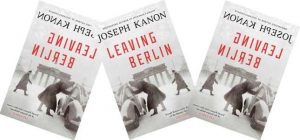
Neil Gordon, writing for The New York Times, called Joseph Kanon’s novel THE GOOD GERMAN “thoroughly captivating.”
And Tim Nolan, reviewing Kanon’s novel LEAVING BERLIN in the Wall Street Journal, wrote “Mr. Kanon, author now of seven top-notch novels of period political intrigue, conveys the bleak, oppressive, and creepy atmosphere of occupied Berlin in a detailed, impressive manner.”
Recently, I spoke with Kanon on the phone to learn more about his take on Germany’s capital city.
He tells me “I call what I do, in writing my historical novels, ‘literary archaeology.’ I’m not a scholar in the sense of going over every last scrap of newspaper cuttings. I like to walk the streets of the city I’m writing about and imagine, for example, how a character would have gotten to work. In Berlin in the years immediately following the war, there was no public transportation. People would hitch rides on G.I.s’ Jeeps. Then too, for eight years after the war there were no street lights in Berlin — I kept this in mind while writing — people out at night had to walk darkened, rubble-strewn streets. It isn’t that the reader needs to know every detail; it’s that I have to give those two or three details that give the reader a strong sense of place.”
Kanon continues: “I first visited Berlin in the 1990s when I was thinking about writing THE GOOD GERMAN. In reflecting on the Allied occupation of Berlin after the war, I thought ‘How extraordinary that the U.S. had that kind of power over a foreign population for five years. How did we do?’ I was not looking for bad news — it was the usual mix of good intentions with some bad decisions; the whole thing fascinated me and I wanted to know more. I think of my book projects almost as though I were a graduate student — I know something about a topic but want to learn a lot more.”
I mention to Joe that my grandparents, father and uncle attended Berlin’s Fasanenstrasse Synagogue.
He says: “All that’s left of the building your family knew is those few remnants at the entryway. So a person could easily walk by and not even think of the significance of the structure. You have to use your knowledge and your imagination to picture what was there. The Fasanenstrasse Synagogue, of course was a prime target for the Nazis on Kristallnacht. Think of how terrifying it was to see your synagogue smashed and then to see it going up in flames. Today, it is guarded because of terrorism fears.”
(The Fasanenstrasse Synagogue in about 1916:)
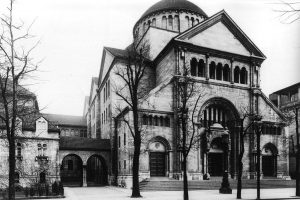
(The Fasanenstrasse Synagogue as it appears today:)
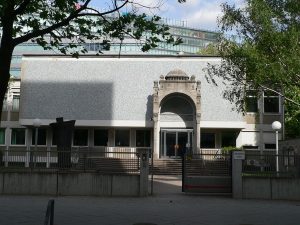
I ask Kanon how writing about Berlin differs from writing about other cities.
“I set my novel ALIBI in the Venice of 1946,” he says, “and because Venice was not destroyed in the war, I had to be a lot more careful — any little mistake you make in describing the city is caught. There’s more leeway in writing about Berlin in the period from 1945 – 1950. People will ask me ‘How long did you live in Berlin?’ I’ve visited many times, but I’ve never actually lived there. Still, I love it — some cities are simply places of the heart, and you may not even quite know why. For one and one-half years, every day I got up and wrote about Berlin. I lived there in my head.”
And Kanon cultivates a particular view of Berlin.
“The layers and layers of history are worth exploring. What happened in World War II was a catastrophe, it is what happened to our world, the West — in Berlin there are visual reminders of it everywhere — we should try to draw lessons from what happened. While for many years after the war, things were hidden, Germany today confronts its history; it is very much a society that examines its past and tries to learn from it.”
One of Kanon’s favorite places in Berlin is the Boros Collection.
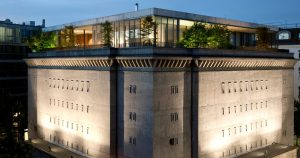
(The Boros Collection seen from outside)
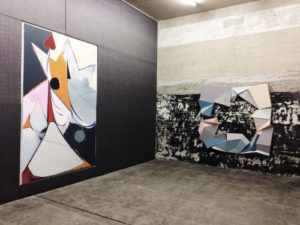
(Artwork inside the Boros Collection)
“It’s really one of those ‘Only-in-Berlin’ things,” he says. “They took a bunker that was indestructible — the businessman Christian Boros bought it — and converted it into a contemporary art museum; Boros has his glass-walled penthouse on the top level. So you’re there, walking around in a bunker but looking at art. It’s extraordinary.”
What is Kanon working on now?
“I’m working on a new novel set in Moscow at the height of the Cold War. Some day, I might catch up with writing about my own time! But this period is so rich and fascinating, so I keep returning to it.”
What is one of his favorite books about Berlin?
“Eugene Ruge’s IN TIMES OF FADING LIGHT. It’s one of the best books about what it was like to live in East Berlin, and simply an outstanding novel.”
For balance, I ask Kanon if there’s anything about Berlin that he dislikes.
“I’m a great Berlin aficionado,” he says, “but it mystifies me how anybody could like currywurst.”

To learn more about Joseph Kanon and his compelling books, visit his website here.

(Joseph Kanon)